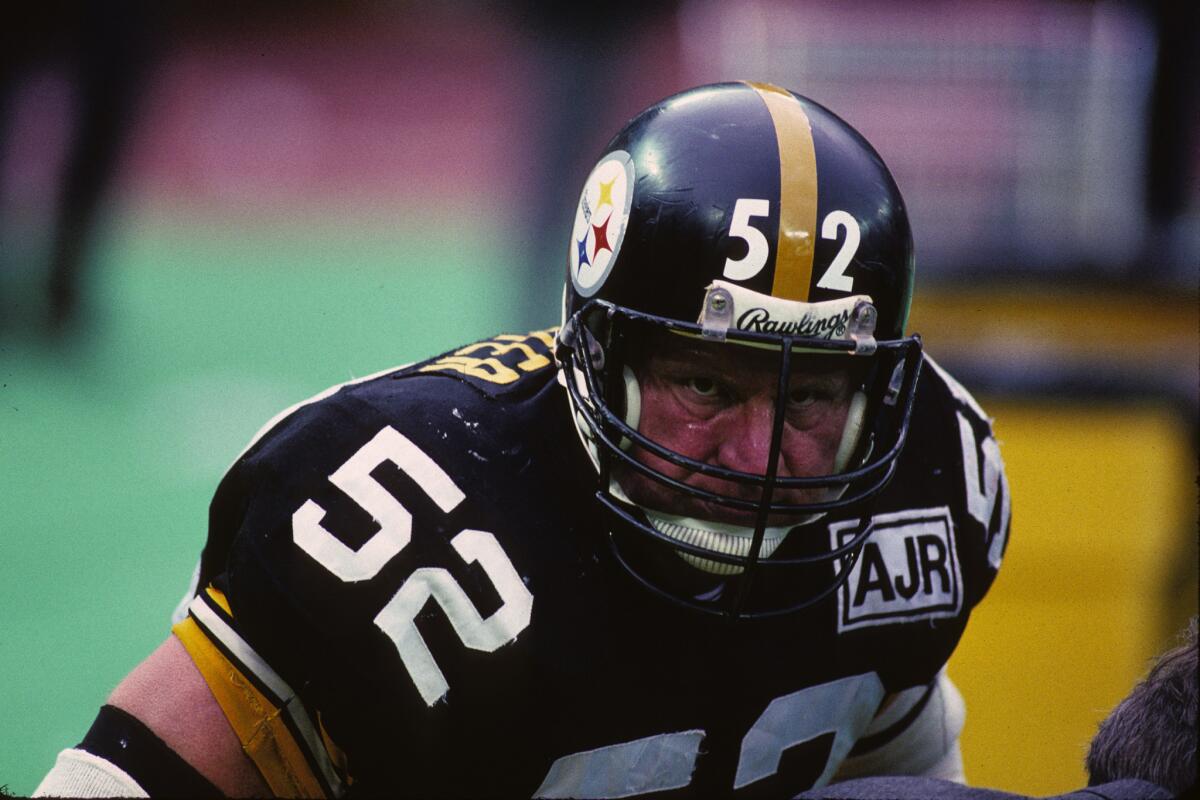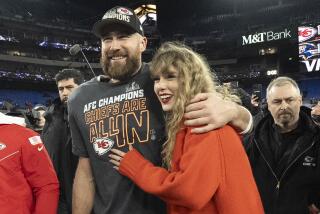NFL executive’s comments on CTE quickly attract notice

Former Steelers offensive lineman Mike Webster was the first retired NFL player diagnosed with chronic traumatic encephalopathy.
- Share via
The day after the NFL’s top health and safety executive conceded a link between football-related brain trauma and chronic traumatic encephalopathy, the simple acknowledgment reverberated far beyond the congressional hearing in a room at the Rayburn House Office Building in Washington.
Even though a Boston-based medical research group led by Dr. Ann McKee has found CTE in 90 of 94 deceased NFL players, the league resisted connecting the sport to the degenerative brain disease.
That changed Monday with a few words from NFL Senior Vice President Jeff Miller during a roundtable discussion with the U.S. House Energy and Commerce Committee. Miller said football is “certainly” linked to CTE, but added that questions remain about the connection.
See the most-read stories in Sports this hour>>
But Steven Molo, an attorney representing four retired NFL players who are appealing the settlement to the long-running concussion litigation between the league and retired players, assailed the league’s shifting position on CTE.
“The NFL’s testimony also directly contradicts its position in the case,” Molo wrote in a two-page letter to the U.S. 3rd Circuit Court of Appeals in Philadelphia. “For example, the NFL argued that ‘researchers have not reliably determined which events make a person more likely to develop CTE.’ And it stated that ‘speculation that repeated concussion or subconcussive impacts cause CTE remains unproven.’”
Paul Clement, an attorney for the NFL, disputed the contentions in a letter filed with the court late Tuesday, writing that Molo “fundamentally mischaracterizes” the settlement.
Clement added that Miller’s comments were “consistent with NFL positions in court and otherwise” and that they have “no bearing on the pending appeal.”
Under the settlement, families of players who received a postmortem diagnosis of CTE before U.S. District Judge Anita Brody approved the deal last April 22 can receive up to $4 million. CTE diagnoses after that date aren’t compensated, and players and their families who participate in the deal are barred from suing the league over the disease in the future.
The settlement applies to all of the estimated 17,000 retired players, regardless of whether they sued, other than about 200 players who opted out and can pursue litigation against the league on their own.
A second attorney appealing terms of the settlement, George Cochran, asked the appellate court in a letter Tuesday to allow players diagnosed with CTE in the future to not be bound by terms of the settlement.
In a written statement, Christopher Seeger, co-lead counsel for the retired players in the case, welcomed the NFL’s acknowledgment about CTE.
“Retired NFL players brought this case to obtain security and care for the devastating brain injuries they were experiencing at a rate much greater than the general population,” Seeger said.
But a son of the first NFL player diagnosed with CTE wasn’t impressed.
“It’s disgusting that it’s taken them this long to admit anything,” Garrett Webster wrote in an email to The Times.
His father, Mike Webster, was a Pro Football Hall of Fame center for the Pittsburgh Steelers. In the years after an almost two-decade career, Webster got lost on routine trips, struggled with homelessness and shocked himself with a stun gun to sleep. He suffered from dementia and died unexpectedly in 2002 at age 50.
After a Facebook message Monday alerted Garrett Webster to the NFL’s acknowledgment about CTE, he said his first reaction was an urge to vomit.
“I’m sure they will trumpet the announcement like they are taking progressive steps,” Webster wrote, “then they will ignore it for a few months again and hope the problem goes away and dies like so many ex-players.”
But four members of the congressional committee that heard Miller’s testimony wrote Tuesday to NFL Commissioner Roger Goodell asking what steps the league will take in light of the admission.
“We seek to better understand whether this new attitude will translate into additional actionable measures to prevent repetitive brain trauma in current players, encourage programs and protocols to protect children in youth leagues and provide support for current and retired players at risk of this disease,” the letter said.
The lawmakers, including Rep. Jan Schakowsky (D-Ill.), who pressed Miller on CTE, want Goodell to respond to four questions by March 29.
At the Super Bowl last month, Goodell said the league has changed 39 rules over the past decade to address concussion-related issues and has “invested aggressively” in research to address the problem.
“We’re seeing a lot of great changes that are leading to positive changes that are making the game safer,” Goodell said. “We’re not going to wait for science, we’re going to get out and make changes in our game.”
The long-term impact of the NFL’s new stance on CTE isn’t clear. Two lawyers involved with the concussion litigation against the league don’t expect it to affect the settlement.
“It’s unfortunate that only after the NFL has immunized itself from virtually all liability through the settlement, it finally begins to tell the truth,” said Paul Anderson, an attorney whose Kansas City, Mo., firm represents the family of the late Kansas City Chiefs linebacker Jovan Belcher.
In 2012, Belcher shot and killed his girlfriend then took his life. An autopsy later found that the 25-year-old suffered from CTE.
Chris Nowinski, executive director of the Concussion Legacy Foundation, noted that until Monday, the NFL had “always avoided the specific question of CTE” and that he had believed the league would wait until the concussion litigation was resolved to acknowledge “this very obvious connection.”
It finally happened — and the impact of Miller’s words seems unlikely to dissipate any time soon.
“This will be cited by lawyers until the end of time,” Nowinski said.
Follow Nathan Fenno on Twitter @nathanfenno
Follow Sam Farmer on Twitter @LATimesFarmer
MORE ON NFL
Rams re-sign tight end Cory Harkey
Son of former player is not impressed by NFL acknowledgment of CTE link
More to Read
Go beyond the scoreboard
Get the latest on L.A.'s teams in the daily Sports Report newsletter.
You may occasionally receive promotional content from the Los Angeles Times.












